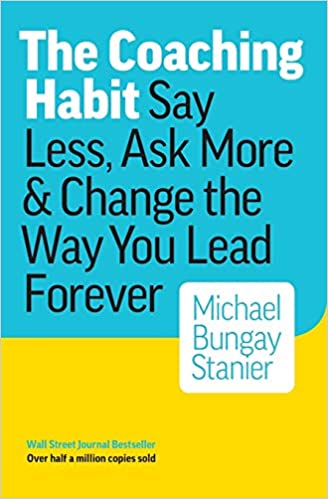This post is part of the 📖 The Coaching Habit series.
Today, I am reading a new section The Strategic Question: If You’re Saying Yes to This, What Are You Saying No To? from Question Masterclass Part 6 chapter of the book The Coaching Habit written by Author, Michael Bungay Stanier.
Yesterday, I read a section Question Masterclass Part 6 from a chapter Question Masterclass Part 5. from the book
Chapter 6
The Strategic Question: If You’re Saying Yes to This, What Are You Saying No To?
Too often, we kinda sorta half-heartedly agree to something, or more likely, there’s a complete misunderstanding in the room as to what’s been agreed to.
Ask, “Let’s be clear: What exactly are you saying Yes to?” brings the commitment out of the shadows.
If you then ask, “What could be fully committed to this idea look like?” it brings things into even sharper, bolder focus.
But a Yes is nothing without the No that gives it boundaries and form.
There are two types of no answers here.
If you say Yes to this meeting, you’re saying No to something else that’s happening at the same time as the meeting.
No you’re uncovering—which will likely take the conversation another level deeper—is what you now need to say to make the Yes happen.
You can use the 3P model you read about in the Kickstart Question chapter to make sure you cover all the bases.
Projects
What projects do you need to abandon or postpone? What meetings will you no longer attend? What resources do you need to divert to the Yes?
People
What expectations do you need to manage? From what Drama Triangle dynamics will you extract yourself? What relationships will you let wither?
Patterns
What habits do you need to break? What old stories or dated ambitions do you need to update? What beliefs about yourself do you need to let go of?
When Should You Say No? (And When Should You Say Yes?)
How to Say No When You Can’t Say No (Part 1)
Bill “Mr Simplicity” Jensen taught me that the secret to saying No was to shift the focus and learn how to say Yes more slowly.
Saying Yes, more slowly means being willing to stay curious before committing.
Which means asking more questions:
- Why are you asking me?
- Whom else have you asked?
- When you say this is urgent, what do you mean?
- According to what standard does this need to be completed?
- By when? If I couldn’t do all of this but could do just a part, what part would you have me do?
- What do you want me to take off my plate so I can do this?
Saying Yes, more slowly means being willing to stay curious before committing.
Tomorrow, I am going to read the important section How to Say No When You Can’t Say No (Part 2). from the same The Strategic Question chapter.

Do you know you can listen to this book on Amazon Audible for FREE?
If you are not into reading like me, then you can listen to this book for FREE on Amazon Audible
Don't Read. Just 🎧Author(s): Michael Bungay Stanier
Part 16 of 21 in the 📖 The Coaching Habit book series.
Series Start | The Coaching Habit - Day 15 | The Coaching Habit - Day 17
